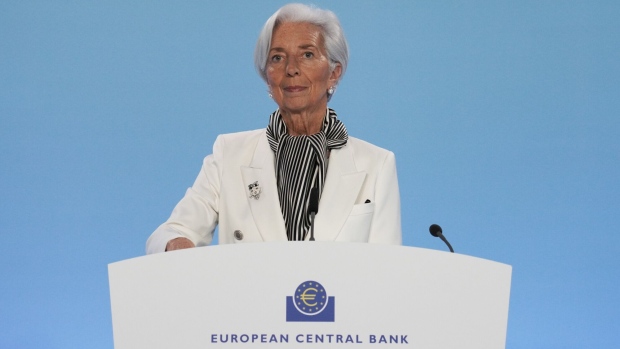Jan 25, 2024
ECB’s Lagarde Stands By Comments on ‘Likely’ Summer Rate Cut
, Bloomberg News

(Bloomberg) -- President Christine Lagarde’s muted affirmation that the European Central Bank may begin lowering interest rates from around mid-2024 was taken by markets as a sign that earlier moves are very much in play.
While she stood by remarks from Davos that borrowing costs could be trimmed from the summer, traders stepped up bets on cuts — pricing an 90% chance of a reduction in April and 141 basis points of easing across the whole year, up from 130 basis points before.
The wagers come despite pleas from the likes of the International Monetary Fund that central bankers around the world don’t loosen monetary policy too hastily, before inflation is overcome.
Speaking after the ECB left its deposit rate at 4% for a third meeting, though, Lagarde’s pushback against investors’ expectations appeared limited as she highlighted the struggles of the 20-nation euro-zone economy and an improving picture on prices.
“Although President Lagarde ‘stands by’ her previous comments which suggested that summer cuts are likely, the rest of her narrative appears to be supportive of earlier rate cuts,” said Seema Shah, chief global strategist at Principal Asset Management.
“As she noted, risks to economic growth are to the downside, underlying inflation remains on a downward trend, and wage growth is declining,” Shah said. “The ECB is clearly data dependent, but the data they focus on are pointing to a rate cut within the next few months, potentially April. Summer might come early this year.”
For reassurance that inflation is on a path back to 2%, ECB officials want to see the results of Europe’s first-quarter wage deals and get a sense of how extensively firms are passing higher costs on to customers. That suggests no rate cuts before June.
“The consensus around the table of the Governing Council was that it was premature to discuss rate cuts,” Lagarde said. “We need to be further along in the disinflation process before we can be sufficiently confident that inflation will actually hit the target in a timely manner.”
She also addressed the danger of renewed supply-chain snarls amid attacks on Red Sea shipping, saying the ECB is looking “attentively” at those developments.
“Upside risks to inflation include the heightened geopolitical tensions, especially in the Middle East, which could push energy prices and freight costs higher in the near term and hamper global trade,” Lagarde said.
What Bloomberg Economics Says...
“The two statements published by the ECB today were somewhat dovish. That suggests the Governing Council is preparing the ground for an interest-rate reduction. However, President Lagarde refused to discuss when the cut may occur, suggesting it won’t be anytime soon. Bloomberg Economics still thinks it will come in June, although the ECB has left open the possibility of April.”
—David Powell and Maeva Cousin, economists. Click here for full REACT
Attention remains, however, on the steep plunge in inflation last year, which — despite an uptick in December — is set to continue in 2024 as Europe remains on the brink of a recession.
“The likelihood of a rate cut being delivered before summer has increased,” said Frederik Ducrozet, head of macroeconomic research at Pictet Wealth Management. Lagarde “could have pushed back more strongly against market pricing betting on more than two quarter-point rate cuts by June. That she decided not to is an important signal in itself.”
--With assistance from William Horobin, James Regan, Alessandra Migliaccio, Alice Atkins, Sonja Wind, Christoph Rauwald, Joao Lima, Alexander Weber, Jan Bratanic and Aline Oyamada.
(Adds Bloomberg Economics.)
©2024 Bloomberg L.P.






